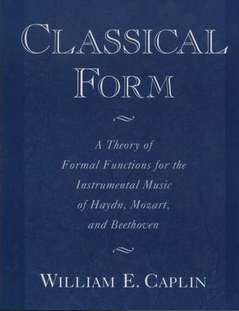 In my pedantically wonkish way, I’m excited to be teaching my sonata-form classes with William E. Caplin’s book Classical Form (Oxford, 1998), as I have been for several years now. For those who don’t know it, Caplin went through the complete sonata-form works of Haydn, Mozart, and Beethoven, and catalogued everything that happens in all of them – what theme the development starts with, what relative keys get referred to in the codas, and like that. I don’t use the book as a textbook: even though Caplin’s writing style is admirably clear, it’s too dense and dependent on hundreds of examples, and to tell the truth, I’ve never yet gotten through the whole thing myself. Read four paragraphs and your eyes glaze over from the amount of detailed information you’re trying to take in. (I once talked to someone at Oxford about how useful an undergrad-friendly version of the book would be, and she told me one was being contemplated.) But I’ve outlined chapters for my students as a kind of flowchart for what’s possible in sonata form, and it’s made it feasible to teach the subject honestly. I think when I was in school I was given some kind of “typical” sonata form chart (if indeed we ever paid any attention to any music before Webern, which I don’t specifically recall doing), from which, of course, every sonata we ever looked at – deviated. But Caplin offers a descriptive plan rather than a prescriptive one. So yesterday in class we went through the outline, and then through movement 1 of Beethoven’s Op. 2 No. 3 – and every move Beethoven made was one of the possibilities in the Caplin-based flow chart. One student, who had apparently gotten a whiff of the old prescriptive-style training, asked, “Can we look at a typical sonata first, one that follows all the rules?” And I said, “There’s no such thing as a typical sonata. Might as well ask me to go out on the street and bring in a typical person.” Instead of having to explain why every piece we listen to is an exception to most of the rules, I can teach the whole conception of sonata form as a range of possibilities and, better yet, meanings, some of which get chosen for identifiable logical or expressive reasons. It’s nice to have one theoretical subject I can teach without making excuses for the lameness of the pedagogy. (Sometimes we look at Clementi, Dussek, and Hummel, too, and find some possibilities outside Caplin’s range.)
In my pedantically wonkish way, I’m excited to be teaching my sonata-form classes with William E. Caplin’s book Classical Form (Oxford, 1998), as I have been for several years now. For those who don’t know it, Caplin went through the complete sonata-form works of Haydn, Mozart, and Beethoven, and catalogued everything that happens in all of them – what theme the development starts with, what relative keys get referred to in the codas, and like that. I don’t use the book as a textbook: even though Caplin’s writing style is admirably clear, it’s too dense and dependent on hundreds of examples, and to tell the truth, I’ve never yet gotten through the whole thing myself. Read four paragraphs and your eyes glaze over from the amount of detailed information you’re trying to take in. (I once talked to someone at Oxford about how useful an undergrad-friendly version of the book would be, and she told me one was being contemplated.) But I’ve outlined chapters for my students as a kind of flowchart for what’s possible in sonata form, and it’s made it feasible to teach the subject honestly. I think when I was in school I was given some kind of “typical” sonata form chart (if indeed we ever paid any attention to any music before Webern, which I don’t specifically recall doing), from which, of course, every sonata we ever looked at – deviated. But Caplin offers a descriptive plan rather than a prescriptive one. So yesterday in class we went through the outline, and then through movement 1 of Beethoven’s Op. 2 No. 3 – and every move Beethoven made was one of the possibilities in the Caplin-based flow chart. One student, who had apparently gotten a whiff of the old prescriptive-style training, asked, “Can we look at a typical sonata first, one that follows all the rules?” And I said, “There’s no such thing as a typical sonata. Might as well ask me to go out on the street and bring in a typical person.” Instead of having to explain why every piece we listen to is an exception to most of the rules, I can teach the whole conception of sonata form as a range of possibilities and, better yet, meanings, some of which get chosen for identifiable logical or expressive reasons. It’s nice to have one theoretical subject I can teach without making excuses for the lameness of the pedagogy. (Sometimes we look at Clementi, Dussek, and Hummel, too, and find some possibilities outside Caplin’s range.)
The End of Exceptionalism
I’ve told the wonderful story before about my late friend Jonathan Kramer who said to a class, “You’ve all probably been taught the fiction that there are three kinds of minor scale.” Student: “If that’s the fiction, what’s the reality?” Jonathan: “There is no reality.” But in sonata class, there’s now a reality.
